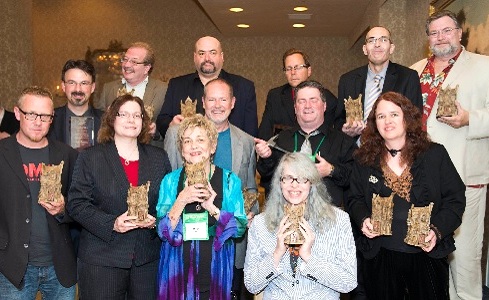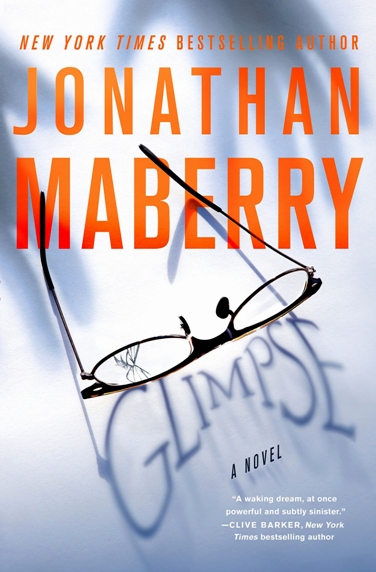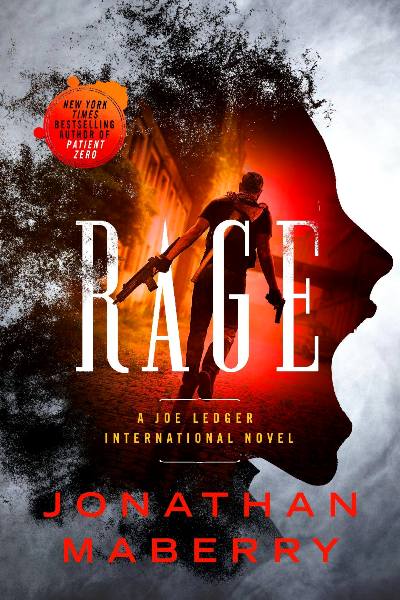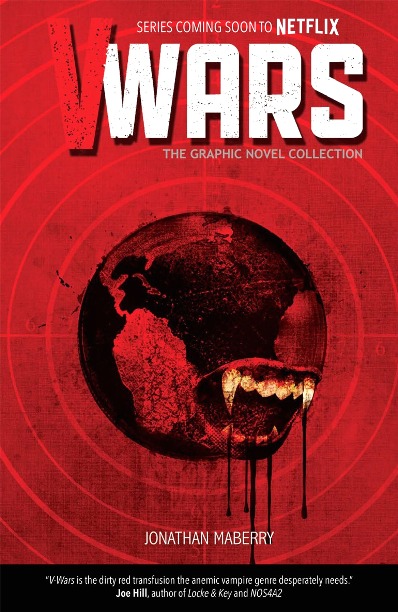

On this month's Special Page
Trish Wilson has a chat with writer extraordinaire Jonathan Maberry
IN THE "SPECIAL PAGE" ARCHIVES:
Trish Wilson
J.G.Faherty
Nancy Kilpatrick
Joe R. Lansdale
Christian A. Larsen
Marc Ciccarone
Mylo Carbia
John Kachuba
INTERVIEW WITH JONATHAN MABERRY
by Trish Wilson
TRISH WILSON: You are insanely productive, writing novels, media tie-ins, teaching, lecturing and more. You also write in a multitude of genres. What does a typical day look like for you?
JONATHAN MABERRY: I’m a full-time writer, which means this is not only my job but my business. Every project is scheduled and then budgeted for time (including research time, edits, etc.). On a typical day I write for four hours in the morning and another four in the afternoon. It shakes out to about 4,000 words per day. When I do events –and I do a bunch!—I have to adjust my anticipated output. Also, there are days where there’s a lot of business stuff to do: phone calls, emails, interviews, contracts, and so on. With a complex business there is a lot of complexity to be managed. Sometimes it’s like juggling chainsaws, and sometimes it’s more serene. In terms of output, I work on one novel at a time, but I have to budget in time for comic book scripts (I’m currently writing my new series, PANDEMICA for IDW) and short stories. And I edit one to two anthologies a year, and am the editorial director for the relaunch of Weird Tales. All of that has to get done. I pay attention to my process to look for areas of inefficiency or time-wasting. So far this year I’ve written two novels (as of July 1), and have two more scheduled, and I’m appearing at around twenty events. But, hey, idle hands are the devil’s tools. Or Cthulhu’s…
TRISH WILSON: You are the Zombie god, with your YA post-apocalyptic zombie series Rot & Ruin and Zombie CSU: The Forensics of the Living Dead. What is it about zombies that has caught the public's attention so much? Why do you like them so much?
JONATHAN MABERRY: I’ve been a zombie fan longer than they’ve been called that. When I was ten I snuck into a movie theater in my Philadelphia neighborhood to see the world premier or NIGHT OF THE LIVING DEAD. October 2, 1968. I was enthralled. All the way home I was continuing that story in my head, figuring out how I might survive an event like the dead rising. (Note: the name ‘zombie’ was added to the flesh-eating ghouls by European film distributors, and it’s irrevocably stuck). Since then I’ve written about them in some of my nonfiction books, and when I wrote my 4th novel, the weird science thriller, PATIENT ZERO, I wanted to have some fun exploring how a Special Ops team might fare against terrorists who had a zombie plague. Shortly after that I wrote my first-ever Young Adult novel, ROT & RUIN, which allowed me to explore the world as it might be fourteen years after the zombie apocalypse. So far there are seven novels in that series, a graphic novel, and a Webtoon about to launch in September. It’s also in development for film.
Then I went back and wrote DEAD OF NIGHT, which explained the zombie apocalypse from the very first bite and gave the science. I dedicated that book to George Romero, who later told me it was his favorite zombie novel, and said he wished he’d known enough about science to use an explanation like mine. Later, George and I collaborated on NIGHTS OF THE LIVING DEAD, an anthology, and for that he asked me to write a story officially connecting DEAD OF NIGHT and it’s sequel, FALL OF NIGHT to NIGHT OF THE LIVING DEAD. That was a huge honor.
I’ve also done some zombie comics. First was collaborating with Fred Van Lente, Seth Grahame-Smith, and David Wellington on MARVEL ZOMBIES RETURN; and more recently I wrote a prequel comic to what was intended to be George’s last flick, ROAD OF THE DEAD.
TRISH WILSON: You have a long history as a non-fiction writer. What kind of non-fiction did you write and how did you come to write fiction? Did writing non-fiction help you write fiction?
JONATHAN MABERRY: I broke into writing by following that old saw of ‘write what you know’. When I was in college, what I knew best was martial arts, having been involved in jujutsu since age six. I sold hundreds of articles to Black Belt, Inside Kung-Fu and other magazines. Then I began writing feature articles, interviews, and how-to pieces on other topics such as skydiving, bartending, relationships, art, dance, teaching, parenting and many others. About 1,200 articles and 3,000 columns, reviews, and filler pieces.
While teaching at Temple University, I wrote textbooks for my own classes (Martial Arts History, Personal Defense for Women, etc.) and for some courses taught by friends (judo, archery, etc.). Prior to switching to fiction, I had a four book deal with a small press, and did three martial arts books for them and then one on the folklore of supernatural predators. The editor asked me to do that last book under a pen name for fear that my martial arts readers would be freaked out, so it came out as THE VAMPIRE SLAYERS FIELD GUIDE TO THE UNDEAD by Shane MacDougall.
The deep research I did on supernatural monsters around the world and throughout history inspired me to try my hand at fiction. You know, just to see if I liked it. The result was GHOST ROAD BLUES, about a group of people living in rural Pennsylvania who encounter vampires and werewolves of the kinds found in folklore. No crosses, stakes, or any of that. The book was so well-received –and it earned a Bram Stoker Award for Best First Novel—and that validated the whole ‘let’s try fiction’ thing. Now fiction defines me, and I’m writing my 36th novel since 2005.
TRISH WILSON: Are any of your works being optioned by Hollywood? What was the filmmaking process like for you? How much creative control did you have?
JONATHAN MABERRY: I have a bunch of fun Hollywood projects ongoing. The biggest is V-WARS, which is a series launching on Netflix near the end of the year. It’s based on a series of shared-world anthologies and comics I did for IDW Publishing. It stars Ian Somerhalder (Lost, The Vampire Diaries), Adrian Holmes (Arrow), Jacky Lai (Flash), Laura Vandervoort (Smallville, Bitten), Kyle Breitkopf (The Silence), and many others. The first season will be ten episodes.
Other projects are under option and in development, including ROT & RUIN, which was picked up by Alcon Entertainment (Bladerunner 2049, The Expanse); and others I can’t mention yet.
TRISH WILSON: How did you come to be involved in Marvel projects?
JONATHAN MABERRY: Axel Alonso, who was editor-in-chief of Marvel, called me out of the blue in 2008. He’d just read PATIENT ZERO and thought that my plotting, action scenes, and dialogue were a good fit for him, and asked if I was game for writing some comics. Yeah. Game. You could say that. He gave me a trial project, an 8-page Wolverine short for that year’s anniversary issues. Then he moved me onto a Punisher standalone (PUNISHER NAKED KILLS), a Captain America miniseries, the Marvel Zombies project, and made me regular writer on Black Panther for a couple of years. But I also got to create my own mini franchise called MARVEL UNIVERSE VS… I did three series of that –Punisher, Wolverine, and Avengers. Since then I’ve done comics for Dark Horse and IDW, which is the house I’m currently writing for.
TRISH WILSON: How did you come to work on X Files projects?
JONATHAN MABERRY: That project came out of a discussion over lunch with Ted Adams, the founder and former CEO of IDW. We were chatting about favorite shows and I mentioned how much I loved the X-Files. His company has the license to do X-Files comics, and he asked if I might be interested in editing an anthology. I said I’d love to. Fox and series creator Chris Carter got involved, and suddenly one anthology turned into three.
During that time –as I was re-watching the entire series—I became interested in some aspects of the show that were touched on but never explored. Particularly the fact that Dana Scully had some minor psychic abilities –to see and talk to the dead; and that she used to believe, but stopped. So I pitched a novel about that, and got approval from Carter and Fox. I sold it to Macmillan’s Imprint division; and brought in my friend Kami Garcia to work on a companion book. I did the Scully novel (X-FILES ORIGINS: DEVIL’S ADVOCATE), set during her high school years and Kami did a Mulder story (X-FILES ORIGINS: AGENT OF CHAOS).
TRISH WILSON: You said in one interview that Joe Ledger is your all-time favorite character to write. Is Joe Ledger based on a real person or persons? How did you create the character?
JONATHAN MABERRY: Ledger is my ubiquitous snarky action hero. I can put him into any kind of story and have fun. He’s in his own series of novels: the 10-volume Department of Military Sciences books, which begin with PATIENT ZERO and end with DEEP SILENCE; and stars in a new series, Rogue Team International, which launches with the first book, RAGE, in November. He’s guest-starred in the V-Wars comics and volume 4 of the prose series, V-WARS: SHOCKWAVES. He’s been in dozens of short stories, novelettes, and novellas. And I invited some of my bestseller friends to write their own Ledger stories for the anthology JOE LEDGER: UNSTOPPABLE, which includes original tales by Steve Alten (MEG), Christopher Golden (SNOWBLIND, JOE GOLEM, etc), David Farland (THE RUNELORDS), Emmy Award-winner Javier Grillo-Marxuach (LOST, DARK CRYSTAL), Larry Correia (MONSTER HUNTER INTERNATIONAL), Scott Sigler (INFECTED, ALIVE), and others.
Joe is loosely based on several people I’ve known who served in various branches of Special Operations.
Joe was born in a diner. I was sitting at the wonderful Red Lion Diner outside of Philly, doing edits on my nonfiction book, ZOMBIE CSU: THE FORENSICS OF THE LIVING DEAD, when two characters began talking in my head. If you’re not a writer this is a serious cry for help. If you…then you listen because it’s a story pulling on your coat in the hopes you’ll pay attention. The conversation was between Joe and Mr. Church, the enigmatic head of a covert group that goes up against terrorist with cutting-edge weird science weapons. I grabbed the conversation and began mapping out who these cats were and what their story was. And Joe Ledger was born.
TRISH WILSON: Do you and Joe Ledger have anything in common?
JONATHAN MABERRY: We have the same ethical and humanist stances. We dislike anyone in government who puts party over the common good. We re notorious smartasses. And Joe shares my own tastes in obnoxious Hawaiian shirts and snarky humor.
TRISH WILSON: Which martial arts have you studied and how do they influence your work?
JONATHAN MABERRY: I started in Japanese jujutsu when I was a kid and am in my 53rd year. I’m officially retired from teaching, though I do practice with swords and other weapons to keep my reflexes in decent shape. I also studied kenjutsu (Japanese swords), Bok Hok Pi (Northern White Crane kung-fu), and a bit of this and that. I boxed and wrestled, too. I worked for years as a bodyguard, then a bouncer. And I was the Expert Witness for the Philadelphia District Attorney’s Office for murder cases involving martial arts. I created some speciality programs for self-defense over the years (ESM: Effective Survival Methods, for women); Steel Wheels (for the physically-challenged in wheelchairs), At Close Range (defense for the visually impaired), and COPSafe (arrest and control workshops for law enforcement to prevent the over-use of force).
The biggest influences on my writing are the focus and discipline I learned in all those years of studying and teaching martial arts. And the practical experience of having been a bodyguard and bouncer –plus growing up in a rough neighborhood—have greatly informed the way in which I construct and write action scenes. It also makes me a snob when watching fight scenes in movies, alas.
TRISH WILSON: Which authors have influenced your own writing? What do you like to read?
JONATHAN MABERRY: I was mentored to a degree by Ray Bradbury and Richard Matheson, having been introduced to them by my middle school librarian. They were kind and very generous with their advice and insights. And Harlan Ellison was a friend who taught me a lot about structure and pacing in fiction. The works of John D. MacDonald (who I only met briefly at a signing), Shirley Jackson, and Robert Bloch were all major inspirations while I learning the writing craft.
As far as who I read…I’m lucky to know virtually everyone who’s books I devour. It’s a delightful side-effect of being in the publishing world. Among my favorites –writers I’d read and follow even if I didn’t know them) are Christopher Golden, Joe Hill, Stephen King, Graham Masterton, Lisa Morton, Victor LaValle, Sherrilyn Kenyon, Tim Lebbon, Mike Mignola, James A. Moore, Dana Fredsti, Josh Malerman, John Sandord, and James Lee Burke. But there are many, many others. I’m an insatiable reader…in print, eBook, and audio.
TRISH WILSON: What do you think of social media, web sites, and blogs as a means for writers to promote themselves and their works? How would you encourage writers to use social media and the Internet?
JONATHAN MABERRY: My fiction career grew up with social media. I saw it’s value early on and jumped aboard in the days of Friendster, AOL chatrooms, and MySpace. These days, with publishers channeling less and less money into marketing, the onus is on the writer to be the chief advocate of his/her career.
What’s important, though, is to remember that social media is the ‘first impression’ for a lot of people, so you need to make it a good one. Being back-stabby and harsh, being too political, kicking other writers, being petty, and being whiny are not the kind of vibes that would encourage folks to lean close and listen to what you have to say. I prefer a more affable and inclusive vibe. My pages aren’t pulpits for me to proselytize my point of view. And they aren’t just bookstalls with which to sell my product. I make them fun. On Twitter (@jonathanmaberry), Facebook (facebook.com/jonathanmaberry) and Instagram (@jonathanmaberry) you’re more likely to engage in a conversation, find a link to someone else’s book review, see a movie trailer, or get a laugh than you are to have me pitch my book at you.
I dedicate ten minutes out of every hour of writing for social media, and I make sure to find ways to have fun. Because it’s not fun, then you’re doing it wrong (and it isn’t interesting how many things in life that philosophy applies to…?)
TRISH WILSON: What advice would you give fledgling authors? What do you feel they need to hear that they may not have been told?
JONATHAN MABERRY: I try to encourage new writers not to mythologize the process of writing. It’s not magic. You don’t have to wait for the sun to slant a certain way through the clouds or the enchanted muse to whisper in your ear. And…if you do, then that’s a call for therapy. Writing is an art, sure, but it’s built on many centuries of craft. Learn the craft. Explore the technical side of it –voice, pace, figurative language, metaphor, POV, etc.—and then go look for examples of it in the books and stories you love. Learn how various authors have taken those elements and worked them to produce compelling stories. That’s where the magic is.
Also, learn how publishing works. Look…writing is, as I said, an art; it’s the intimate conversation between author and reader. Publishing, however, is a business whose sole concern is selling copies of art. They are different ends of a process. People in publishing may have chosen that profession out of a love of books, but they’re job is acquire and publish works that will sell a lot of copies. Same goes for agents and booksellers. Learn how the business functions, learn the etiquette, and work within that structure joyfully instead of approaching it like an enemy castle to be stormed.
TRISH WILSON: What's next on the agenda for you? What are your upcoming releases?
JONATHAN MABERRY: My next novel release will be RAGE (11/5), the first in the new Joe Ledger: Rogue Team International series. In September, though IDW will launch my bio-terrorism comic, PANDEMICA, with art by Alex Sanchez (STAR WARS) and colors by Jay Fotos (LOCKE & KEY). And at the end of September Webtoons will debut their adaptation of ROT & RUIN.

About Jonathan Maberry
Jonathan Maberry is a New York Times best-selling and five-time Bram Stoker Award-winning author, anthology editor, comic book writer, magazine feature writer, playwright, content creator, and writing teacher/lecturer. He was named one of the Today’s Top Ten Horror Writers. His books have been sold to more than two-dozen countries.

About Trish Wilson
Trish Wilson had enjoyed telling scary stories to a captive audience since she was a child. She grew up in Baltimore, the home of Edgar Allan Poe who has inspired her to write. Due to her love for horror and dark fiction she joined Broad Universe, a networking group for women who write speculative fiction. Her short stories have appeared in Zippered Flesh 2, Zippered Flesh 3, Teeming Terrors, Midnight Movie Creature Feature 2, Wicked Tales: The Journal of the New England Horror Writers Vol. 3, Heart of Farkness, and more. She won a Best Short Story mention on The Solstice List@ 2017: The Best Of Horror for Invisible, which appears in Zippered Flesh 3.
In addition to horror, she writes erotica and romance as Elizabeth Black. She lives on the Massachusetts coast in Lovecraft country. The beaches often call to her, but she has yet to run into Cthulhu.


